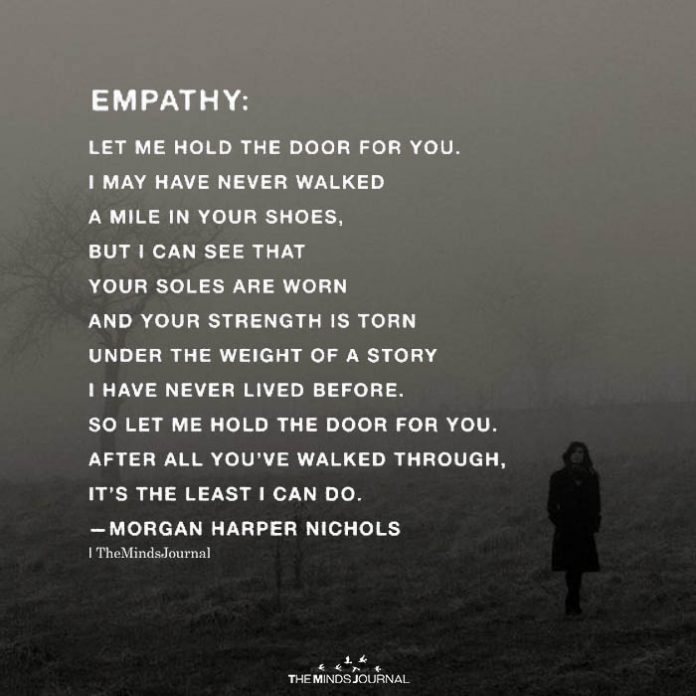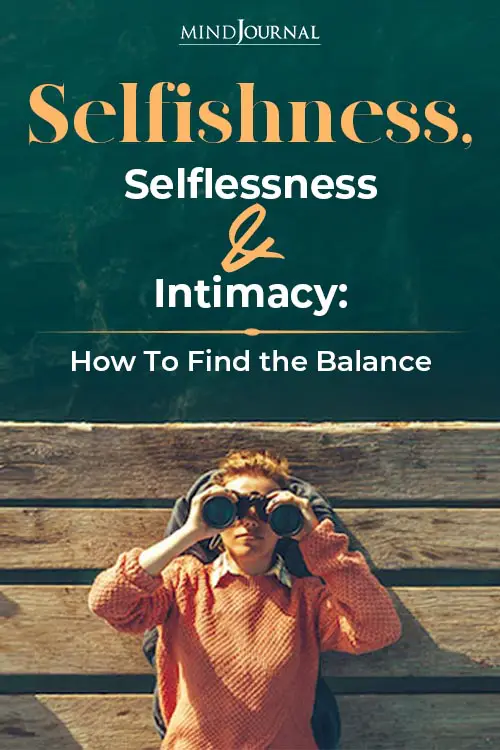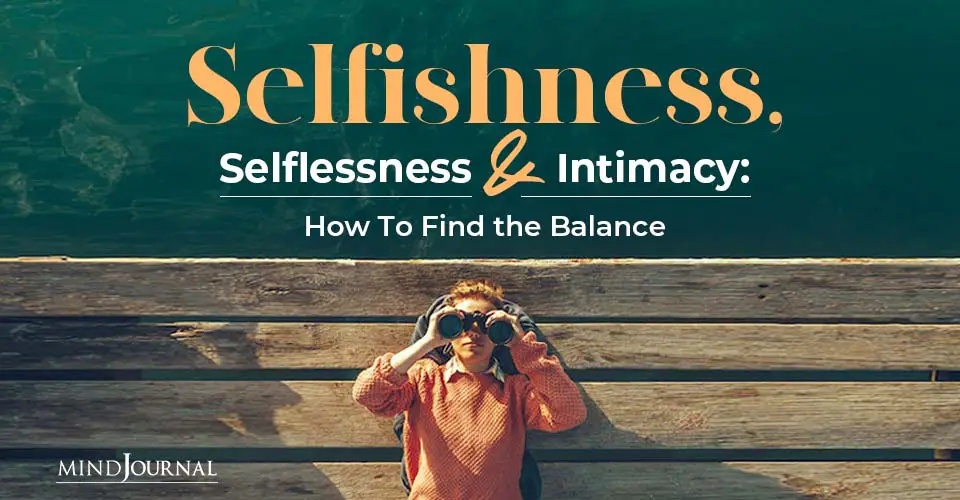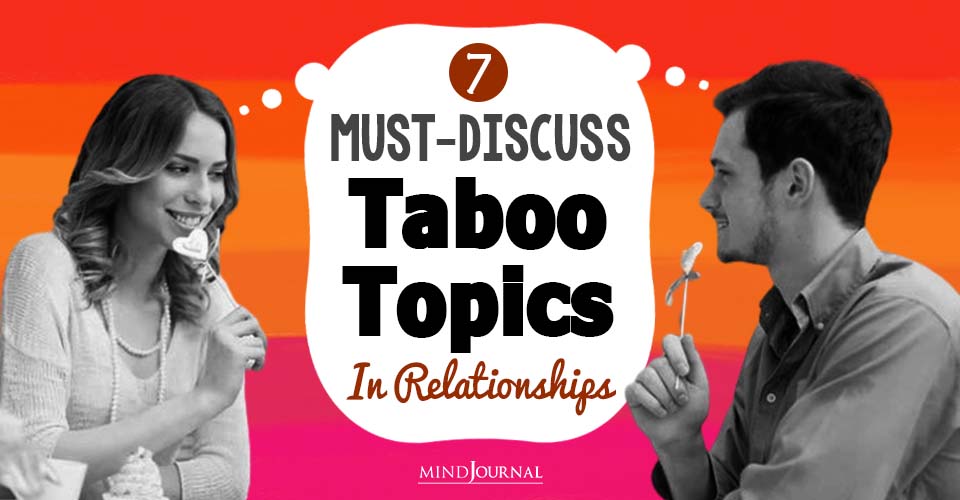Is “selfish” a bad word? If you call someone “selfish,” they are likely to be offended. Selfish is thought to be a defect and is undesirable. For this reason, most people think that selfishness is bad for intimacy and selflessness is good. But things might not be so black and white.
Selfishness Defined
The common concept of a selfish person is the image of a person who only cares about themselves and takes pride in neglecting the needs and feelings of others. Selfishness is considered the emblem of narcissism and hence shunned.
The term selfish refers to one who champions the wants and the needs of the self above others. Is this unhealthy? Undesirable? Let’s consider the alternative.
Related: What’s The Difference Between Self-Centeredness, Selfishness, and Self-Awareness?
Selflessness Defined
Selflessness is considered to be a virtue. Such individuals are seen as generous, spiritual, and loving. Individuals who sport these qualities are thought to be desirable and capable of great intimacy and love.
The term selfless means literally one without a self. The needs of others are put before the self because the self has little or no substance and hence little or no value. For example, the term “people pleaser” refers to individuals who define their value by serving others and forsaking themselves. Does this sound healthy? Intimate? Let’s see.
Related: The 6 Most Selfless Zodiac Signs Of All: Are You One?
Sharing
A core quality of intimacy is the sharing of oneself. Sharing requires revealing your thoughts, feelings, preferences, and character. This is where much of the vulnerability associated with intimacy comes from. Below is a typical conversation between Selfless Sally and her best friend, Haley. Is this sharing?
Haley: Sally, where would you like to go for dinner tonight?
Sally: Wherever you want to go is fine with me.
Haley: What kind of food do you feel like having?
Sally: I can always find something I like. You pick the place.
Haley: Would you like to eat now or wait a little while?
Sally: I am good either way.
At first glance, we see Selfless Sally as easygoing and easy to get along with. How much of herself did she share? Her friend Haley gallantly tried to find out what Sally wanted to eat and when, but Sally offered nothing. Her giving in to Haley on every point actually serves to hide her feelings, desires, and character. This is actually avoidance of intimacy. Now let’s see what happens when Selfish Sam has the same conversation with his friend Mac:
Mac: Hey Sammy, where would you like to go for dinner tonight?
Sam: I know the best steak place on the planet.
Mac: Where is it?
Sam: About an hour from here. Why don’t you go get your car?
Mac: You want me to drive?
Sam: Yes, I feel like having some cocktails.
Selfish Sam seems like a less desirable person to be with than Selfless Sally. But Mac knows way more about Selfish Sam from his exchange than Haley does about Sally. Because Sam is self-absorbed, he doesn’t care what Mac or anyone else thinks about him; he lets it all hang out. He is much more accessible than Sally. Let’s look at another core quality of intimacy.
Related: 9 Reasons Why Empaths Are The Best People To Have Around
Empathy

Sharing of oneself is only useful if the other person accepts the invitation. Empathy is feeling the emotions of others when they offer to share.
On the surface, Sally seems like an empathetic friend. She is willing to go along with anything her friend Haley asks of her and expresses pleasure at doing so. But Haley is not asking for Sally to acquiesce, she is asking her to share. But Sally refuses.
Sam does not show any effort to empathize with Mac but he does allow Mac to empathize with him. The ideal approach to intimacy, where both parties empathize with each other, is not available either to Sally or Sam. With Sally, no empathy is possible because she refuses to share herself (although she does share her time). Sam is not interested in Mac’s feelings, so he does not even attempt to empathize with Mac, but he does make his feelings very clear and Mac can feel them if he so chooses. Suboptimal, but not zero.
So why is Sally seen as more empathic and more desirable, when in fact she is not accessible? Because Sally’s selflessness allows her to be whoever anyone wants her to be. Haley sees herself in Sally. If Haley wants a hamburger, Sally will say that she wants one too. Perfect companion! As long as Haley likes herself, she will like Sally. But she cannot feel close or intimate.
The biggest barrier to intimacy for Sam is that he can’t see Mac. He doesn’t care to. Mac will feel invisible because Sam does not ask or consider his feelings or needs. What if Mac wants to also have a cocktail? This doesn’t even occur to Sam. Thus, Mac cannot feel close to him.
Related: Affection and Love: 10 Ways to Improve Intimacy in Your Relationship
Intimacy requires the participation of two individuals, each with a healthy balance between selfishness and selflessness. Here are some examples of what that balance is based upon:
- Sufficient selfishness is required to express and assert your needs for the purpose of sharing.
- Sufficient selflessness is required to put your own feelings aside temporarily while you feel someone else’s feelings.
- A sufficient level of selfishness is necessary to be able to share with or please another person without losing yourself. Sally is a people-pleaser and completely loses herself (she becomes Haley) when her friend tries to share with her.
- A sufficient level of selflessness is necessary to derive pleasure from pleasing another person or sharing with them. Sam is too self-absorbed to experience this.
Finding a balance between selfishness and selflessness is personal and unique to each individual. Your personal balance should be based on how you feel about intimacy and other aspects of socialization that are affected.
What do you think?
Written by: Daniel S. Lobel, Ph.D.
Originally appeared on Psychology Today
Republished with permission.









Leave a Reply
You must be logged in to post a comment.